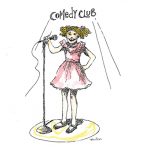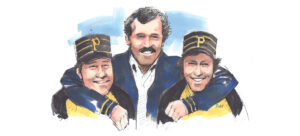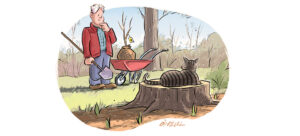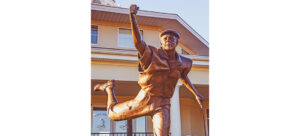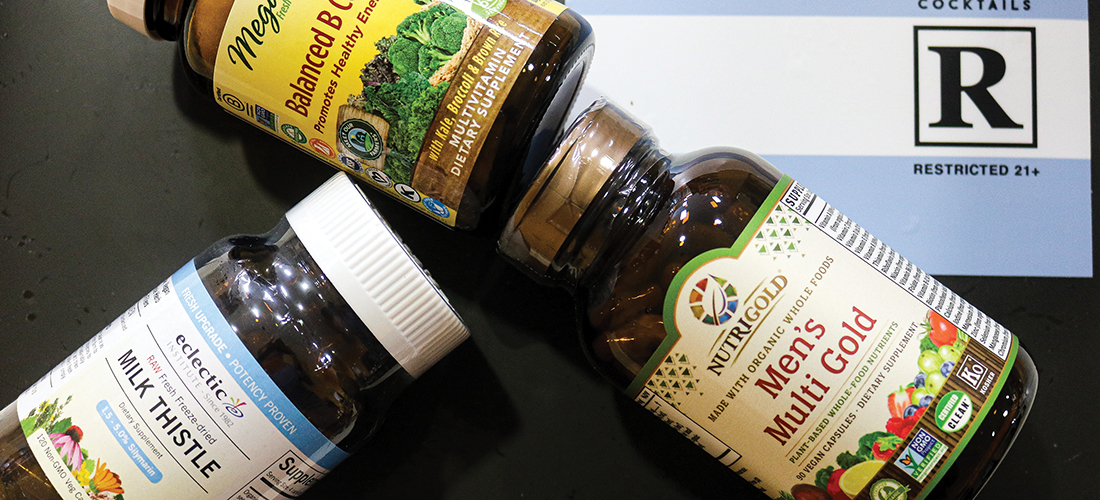
The Hangover
Making sure the sequel is a dud
By Tony Cross
I run my cocktail delivery business out of a health food store. Shocking, I know. I love working out and eating healthy — during the week, that is. On the weekends I’ll let loose. There are some who might say I have a supplement problem. And by “problem” I mean taking myriad vitamins to ensure I stay tip-top. When customers learn I run a cocktail business, too, the look of confusion is priceless. One of the first questions I’m asked when people find out about my double life is: What do you take for hangovers?
The Mayo Clinic defines a hangover as “a group of unpleasant signs and symptoms that can develop after drinking too much alcohol.” If you enjoy reading a spirits column, this is not exactly CNN breaking news. And if you’ve never experienced one, you’re a better person than me. Maybe. Long story short: They’re awful, and they get worse with age. Although there is no magical cure for a hangover, I’ve learned a few things along the way. But first, the basics.
Consuming a glass of water per alcoholic beverage is going to help you from becoming dehydrated, which is a huge hangover symptom. Also, avoid excess sugar in your cocktails if you’re going to be making a night of it. When I was 21 and bartending at a private party, the host told me that there was a bottle of Crown Royal hidden for a lady who would be arriving later in the evening. The whisky was only for her. I took that responsibility with pride, since Crown was the only liquor I drank at the time.
When the woman arrived, I shared my affinity for the spirit, prompting her to ask, “How do you take it?” I replied confidently, “With Coke.”
“Oh, no, honey, no!” she exclaimed. “That’s only making your hangover worse. Take it over ice or with water.” Important lessons from decorated professionals should be taken seriously. I never drank Crown and Coke again.
First and foremost, I strongly believe that having a healthy lifestyle is key; it’s all about balance. I know from experience that treating your body with respect throughout the week will help those weekend hangover blues. Having a clean diet is the number one priority. That doesn’t mean being on a diet, it simply means eating as cleanly as possible, and limiting the processed foods and sugars you put into your body.
Next, exercise. Alcohol is a depressant, and for some folks it’s easy to slip into a routine of having a few drinks every night after work, and then more on the weekends. I’m speaking from experience on both fronts. I am happier, more confident, and have wayyy more energy when I’m in my workout routine. I’m not saying that exercise is going to prevent your hangover, but if you’re in good shape, and work out often, the hangovers are easier for the body to process.
Now, let’s talk supplements.
As a rule of thumb, I always recommend a good multi-vitamin. No matter how clean your diet is, you’re still probably not getting all of the vitamins/minerals you need on a daily basis. When you’re consuming alcohol, your vitamins get depleted, and it adds to why you don’t feel so great the next day.
B-Complex: A lot of mental and emotional wellbeing that takes a beating after a night of over-indulgence comes from B vitamin deficiency. Most people will just take a B12 tablet, but that’s not good enough. When your Bs — 1, 2 and 3 — are depleted, depression, irritability and anxiety can be triggered.
Magnesium: This mineral is great for so many things, but being deficient can cause confusion, loss of appetite and weakness. For me, I take the glycinate form of magnesium. It was recommended to me by an amazing fitness trainer who, sadly, no longer lives in North Carolina. After a month of supplementing, I noticed that my panic attacks (especially if I was even slightly hung over) vanished. Seriously. I was this close to getting a prescription from a doctor, which would’ve been a Band-Aid. Instead I’ve been taking this supplement for six years now.
Milk thistle (Silybum marianum): This is a flowering plant grown around the world. Silymarin is one of the substances in milk thistle believed to protect the liver against toxins. Its anti-inflammatory and antioxidant effects help the liver after being damaged. Is it going to cure your hangover? No. Will it help your liver after a night of drinking? Probably. I take a liver supplement during the week at night before I go to bed. I look at it as a multi-vitamin for my liver. When I run out of my bottle of milk thistle, I’ll switch to another company that uses herbs like dandelion and burdock, or another one that uses the resihi, chaga and turkey tail mushrooms. All good for liver protection.
And the winner for “Best One-Two Punch for a Hangover” goes to: ibuprofen. Created by Stewart Adams and his associate John Nicholson in the late 1960s, the drug went to clinical trials in 1969, and was probably first tested on an alcohol-induced headache by Adams in 1971 while he was in Moscow, hours away from giving a big speech. Many shots of vodka the night before led Stewart to give it a go. “He took a handful of ibuprofen and felt fine, no hangover!” recalls his son, David Adams (Smithsonianmag.com 2020). Personally, I prefer Ranger Candy. If you know, you know. PS
Tony Cross is a bartender (well, ex-bartender) who runs cocktail catering company Reverie Cocktails in Southern Pines.

